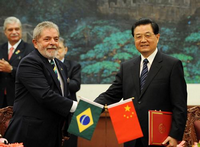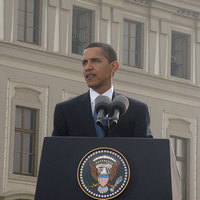I’m probably going to regret saying this, but this, from Nikolas Gvosdev’s brief post about China’s growing irritation with North Korea, brought another strategic relationship to mind: “How Beijing may reorder its strategic priorities based on how Pyongyang’s actions affect its key interests is fascinating.” Of course, I’m talking about the U.S. and Israel. (Let the wild rumpus and angry e-mails begin!) It might have had something to do with having just read Laura Rozen’s revealing piece on how deadly serious the Obama administration is about Israel freezing its West Bank settlements. There’s also this Le Monde interview with Justin […]
Asia-Pacific Archive
Free Newsletter
For anyone who’s not yet aware of it, John McCreary’s NightWatch is really an incredible resource. Not only does McCreary cut through some of the signal noise of news coverage, he also includes generous pointers in terms of crisis analysis and historical context for young analysts. As someone who spends a good deal of time wading through open source coverage, I’m quite grateful that someone like McCreary is both out there and willing to share his expertise. His narrative explanation of North Korea’s strategic objectives from today’s dispatch is essential reading. Most of the reporting I’ve seen emphasizes Pyongyang’s “bluster […]
Banning Garrett beat me to this topic, which had been rattling around in the cranium for the past few days, with his essay at the New Atlanticist: There is an all-too-common practice in Washington punditry ofattributing strategic intentions to other countries without anyapparent evidence. . . . Assessments of strategic intentions are critically important ininter-state relations and should be made carefully and withconsiderable evidence. The stakes in getting it right or wrong can bevery high. Garrett writes in response to a Dan Blumenthal and Robert Kagan op-ed in the Washington Post discussing China’s intentions vis à vis North Korea. But […]
I highly recommend this account by Bruce Tolentino at In Asia about the flag-lowering ceremony that is performed each day before packed ampitheatres on both sides of the only India-Pakistan border crossing: Then, simultaneously, the guards from each side launch repeatedfusillades of choreographed marching and gestures. Aggressively, theyrush the border, furiously stamping their feet, glaring and snorting attheir foes. They stop – inches from one another, never crossing theborder – raise their arms to shoulder height and display thumbs pointeddownward, dismissing the other. Excitement and tension among the crowdsrepeatedly builds and swells, erupting in applause for their respectivenational warriors. This […]
A series of allegations this month against both China and Chinese-based factories that supply Nike and Disney lend weight to previous warnings from the international rights community that the global economic crisis would result directly in human rights abuses — particularly in terms of child labor. Advocates caution that the Chinese examples are merely a snapshot of a much larger problem unfolding across the globe. Ethical Corporation claimed that China’s adherence to the worker-friendly provisions of its’ own labor laws extends little further than public-relations concerns necessitate. It also accused local and provincial governments of telling business and factory owners […]
Yes, well, this is no surprise, really. I’d be pretty keen on directing a major potential competitor far away from the market I’m trying to corner, too. And if I could make some money on the deal, all the better. Unfortunately, the last “I” — for India — is no longer a sure thing on the IPI “Peace” Pipeline. The stabilizing effect that would have had would have made the deal at least a palatable trade-off for losing Iranian gas for Nabucco. Now I’ve seen some reports that the Iranian gas might end up in China after transiting Pakistan. If […]

During the Cold War, U.S. military forces operated in big, firepower-heavy formations, designed to fight equally big and powerful Soviet formations — or what the Pentagon calls “peer” opponents. Times have changed, but the military hadn’t — until now. In recent months, reformers have successfully fought for sweeping changes to military force structure. The changes are meant to boost the Pentagon’s ability to fight in low-intensity, “persistent” conflicts, as opposed to the short, high-intensity major conflicts expected in the recent past. In addition to the structural changes, persistent conflicts demand new ways of thinking about — and training for — […]

Last week was a busy one for Brazilian President Luiz Inácio Lula da Silva. In one week, the Brazilian leader visited China, Saudi Arabia, and Turkey, on a tour intended to strengthen Brazil’s diplomatic and economic ties with those three nations. The three days Lula spent in China, from May 19-21, received more attention than the other legs of the trip, in large part due to the close economic ties between the two nations. Spurred by a mutual demand for each others’ exports — with China seeking Brazilian raw materials, and Brazil seeking Chinese manufacturing — China is now the […]
Chinese involvement to help Pakistan in its counterinsurgency efforts makes perfect sense. The relationship between the two countries was the reason we included China in last fall’s WPR feature issue, The Asian Triangle. At the time, with the “regional solution” still focusing on India-Pakistan, the idea didn’t yet have so much public traction. Indeed, the issue appeared days after the Mumbai attacks, which drilled the focus down even further on the two South Asian neighbors. But China’s partnership with Pakistan and rivalry with India is a major aspect of the South Asian equation. And for reasons that Arif Rafiq made […]
Ria Novosti reports that India has ruled out the Russian-manufactured Il-78 for its upcoming purchase of aerial tankers, due to concerns over spare parts and after-sales service for a fleet purchased six years ago. That made me think of this Richard Weitz column from the WPR archives, back in February, describing the challenges facing the Russian defense industry. The related decline of the Indo-Russian defense relationship at the very moment that India will begin to play a more prominent regional security role is one of the more important defense industry trends going relatively unnoticed in the mainstream press these days, […]
Cheryl Rofer (via Progressive Realist), at the end of an informative post about the North Korean nuclear test, adds this as an afterthought: . . . North Korea, partly on its own and partly because of the actions ofother countries, is isolated in a way that no other country is. It canbe reasonably sure there will be no military retaliation because ofSeoul’s proximity and China’s fear of a flood of refugees. So it isfree to do as it pleases. And, whatever its objectives may be, it canfreely pursue them. This is where strategies of isolating andsanctioning countries leads. The rest […]

New York and Washington may be separated by only a few hundred miles, but in the last few weeks, they have appeared to be light years apart on arms control and nonproliferation issues. In New York, representatives of more than 100 countries worked from May 4-15 to prepare for next year’s nuclear Nonproliferation Treaty review conference. Buoyed by U.S. President Barack Obama’s April pledge to seek a world free from nuclear weapons, their work was marked by a spirit of cooperation and compromise that had been noticeably absent during the eight years of the Bush administration. They approved an agenda […]

Two frustrating EU summit meetings last week, with China and Russia, served to illustrate the EU’s well-known difficulties in conducting foreign policy under its presently awkward institutional structure. These problems have propelled efforts to adopt the Lisbon Treaty, which will restructure how the EU manages its foreign policy representation and decision-making. Even with more coherent foreign policy machinery, however, the EU would still find it difficult to achieve its objectives in the case of difficult dialogue partners such as China and Russia. The May 20 meeting in Prague with a visiting Chinese delegation marked the 11th EU-China summit since 1998. […]
I just saw Clint Eastwood’s “Gran Torino” over the weekend, and I immediately wondered, upon leaving the theater, how it managed to get left out of the recent blog discussion about movies dealing with international relations. The movie examines the long-term effects of war, as reflected in its impact on individuals, but also on the movement of peoples and, by consequence, on culture and society. The Korean War haunts Eastwood’s Walter Kowalski to the point that he conflates his entire reality through the warped and distorted lens of his own prejudices. His life spent working in a Detroit car-manufacturing plant […]
There’s probably some complex game theory calculations necessary to figure out if it makes sense to claim that the DPRK nuclear test was a failure even if it was a success. Then again, the actual seismic data is a matter of public record, and the calculations follow from that. Be all that as it may, according to the FAS’ Hans Kristensen, the initial Russian estimates of a 10- to 20-kiloton Hiroshima-type blast are wildly off the mark. Jeffrey Lewis agrees, putting it in the 2- to 6-kiloton range. That’s better than the .5- to .8-kiloton “dud” from 2006. (Was it […]
I’m not sure I’d characterize the summit between the presidents of Afghanistan, Pakistan and Iran as “the latest sign of Iran’s emergence as the regional power,” as does the NY Times. I might think otherwise if Indian Prime Minister Manmohan Singh had joined them. But he didn’t, meaning this is basically the diplomatic equivalent of a block association meeting. It certainly can’t do any harm, could even do some good, and far from being an example of our inability to isolate Iran, is exactly the sort of thing that we should be — and increasingly have been — encouraging. But […]
Is there any other country on earth about which this sentence could be written? Despite being rigidly observed, Japan’s 1976 ban on arms exports was never passed as a law. Interesting to note that the only exception made to the ban to date was with regard to missile defense technology to address North Korean proliferation threats. As troublesome as the now-nuclear DPRK is to all parties involved, the major destabilization risk, outside of a sudden collapse of the regime, still involves Japan’s potential response. Even if it predates today’s test, the proposed lifting of the export ban comes in the […]
